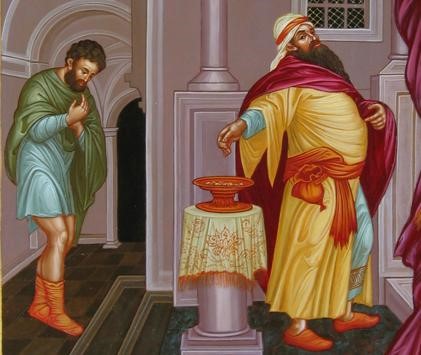Jijo Kandamkulathy, CMF
Claretian Publications, Macau
Lk 18:9-14
The parable in today’s Gospel is directed toward Christians of all times. The idea of “meriting” before God is profoundly rooted in our minds. No one is completely immune to this “leaven” which pollutes and corrupts the life of the community (Mk 8:16).
At the outset, we dislike the hypocritical, disagreeable, proud and presumptuous Pharisee. Our sympathies are all for the publican who had presumably done something wrong but had a repentant, remorseful conscience. If we reread the Pharisee’s prayer without prejudice, we realize that we are faced with an upright, honest person of integrity. He does even more than what is prescribed in the law. He is proud of his righteousness, contrasts himself with other persons and distances himself from sinners. He perceives himself as better than most people but has no other serious faults. Let us willingly forgive a little bit of his pride.
In contrast to the Pharisee, the publican attracts our sympathies for his humility initially. However, he is a certified thief, a hated exploiter, a jackal. He is loaded with sins. The law stipulates how this tax collector can be saved. He must give back all that he has stolen plus 20% interest and immediately abandon his infamous profession. He is seemingly irredeemable!
How can Jesus, then, condemn a person who has behaved well and declare the sinner just? The truth is: the judgment is not about the moral behavior of the two. Jesus does not say that the publican is good and the Pharisee, bad and a liar. He does not say that one is fundamentally virtuous, while the other is a sinner who managed to hide his sins. He only says that the publican “was justified,” that is, was made just by God. The Pharisee returned home as before, with all his undeniable good works but without God’s justification. This is the point.
What is the Pharisee’s error? He makes an error because he puts himself before God in a wrong way. He goes to the temple carrying with him a load of good works accumulated with rigorous penance and scrupulous observance of all the commandments. He is convinced that this is sufficient to merit him righteousness. As if he would say to the Lord: “Look, what a marvelous life I’m presenting! To tell you the truth, I astonish you! You did not expect to have such a faithful worshiper. Now, declare that I am ‘just’!”
Before God, everyone finds oneself empty-handed. They have nothing of themselves to show. They have nothing that can make them worthy of divine assurance.
The publican is not a model of virtuous life. He is a morally poor man who knows he can offer to God only his “broken and torn down heart.” He does not even run the risk of an illusion that good acts give him the right to lay claim on merit because he has none. He is empty-handed.
The Pharisee (anyone for that matter) must not renounce his blameless life but the false image of God as an accountant who takes note of good and bad works of people, a distributor of prizes and punishments. From this deformed image of God, other troubles come. Foremost is the need to create a dividing barrier between the righteous and sinners. As “Pharisee” means “separated,” he inherently likes to stand separated.
Whoever thinks of accumulating merits before God, ends up inevitably despising others. They do not want to have anything to do with the wicked. They are convinced of being able to involve God in this separation. They would like to enlist God in his group, in the club of the righteous. They would like to make of God a Pharisee. God does not fit in that pigeonhole. If God has to choose, God would side with the sinners.
(Indebted to Fr. Fernando Armellini SCJ for the text analysis)


 Follow
Follow


